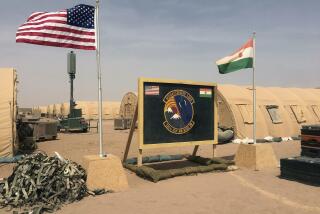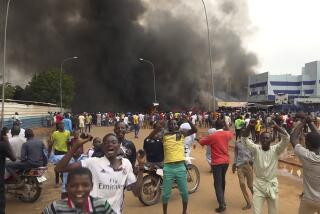Christopher, in Africa, Seeks to Isolate Nigeria
BAMAKO, Mali — Secretary of State Warren Christopher arrived in Mali on Monday on the first leg of a five-nation trek across Africa during which he will try to tighten the squeeze on outlaw regimes, encourage democratic reforms and find a new secretary-general for the United Nations.
On his weeklong tour, Christopher revealed Monday, he will launch a new round of diplomacy aimed at further isolating Nigeria’s military regime, led by Gen. Sani Abacha, by means of selective new sanctions. Oil-rich Nigeria is Africa’s most populous state and the source of up to 8% of U.S. oil imports.
After “glimmerings of hope” last spring, Christopher said, the United States now is “very troubled” by the lack of progress on democratization in Nigeria after results of multi-party elections were effectively voided by the junta in 1993 and the winner was imprisoned on treason charges a year later.
“We are concerned and troubled by the conduct of the government--its human rights violations, the degree of corruption,” Christopher told reporters. “In the 1970s, Nigeria had tremendous promise as being a country that might be one of the leaders not only of Africa but of the world as a whole, and to see how they have forfeited that potential or at least how that potential has not been realized has to be a great disappointment for us and all of Africa.”
As a result, Christopher will talk about tougher action against Nigeria with leaders in the five countries he is visiting--Mali, Ethiopia, Tanzania, South Africa and Angola--as well as with those from other nations who are scheduled to meet with him this week. U.S. officials will follow up with European and British Commonwealth officials in the next month, he added.
The Clinton administration has refused to outline its proposals to isolate Nigeria. But options reportedly include freezing Nigeria’s assets in the United States, banning new U.S. investment there and cutting off sports links between the nations.
The United States now bans arms and military services to Nigeria and has embargoed the issuing of visas. Washington opposes International Monetary Fund loans and credits to Nigeria as well as debt relief for the West African state. More restrictions--including a U.S. veto of Nigerian projects proposed to international financial institutions--have been imposed because of Nigerian links to narcotics. About 40% of heroin now entering the United States is transshipped via Nigeria, U.S. officials say.
But Washington does not intend to propose oil sanctions, largely because neither the United Nations nor Nigeria’s other clients show interest in such moves, U.S. officials said. The United States buys about 40% of Nigeria’s oil exports, American officials say. The rest goes to Europe and Asia. “A unilateral oil embargo does not make political or economic sense,” said a senior U.S. official traveling with Christopher. “Instead, we’re talking about collective sanctions that might be effective if countries band together.”
America’s carrot-and-stick approach will include diplomatic discussions. U.S. special envoy Donald McHenry in effect ended his behind-the-scenes diplomacy late last year, although talks continue through American diplomats in Lagos, the largest city and commercial capital, and the new Nigerian ambassador to Washington. “We’ve always been of the view that pressure without dialogue is unlikely to yield anything, as is dialogue without pressure,” the senior official said.
The other initiative Christopher will undertake in Africa is finding new U.N. leadership. In a virtual ultimatum to Africa’s leaders, who have been among the Egyptian incumbent’s staunchest supporters, Christopher called for candidates to be nominated as soon as possible to replace U.N. Secretary-General Boutros Boutros-Ghali; his term is to expire in December.
“It’s time for Africa to come forward with some strong candidates. We think African candidates deserve consideration,” Christopher said. “But unless some are offered, we will be left without them to consider. That would be a disadvantage from the standpoint of Africa.”
So far only two names have emerged: Salim Salim, a Tanzanian who is secretary-general of the Organization of African Unity, and Kofi Annan, the Ghanaian who is U.N. deputy secretary-general for peacekeeping. Two other names mentioned in African circles are Ivory Coast Foreign Minister Amara Essy and Gen. Hamid Algabid, the Nigerian who is secretary of the Organization of the Islamic Conference. Neither is thought to be a strong possibility.
The United States--which has sought Boutros-Ghali’s replacement in a disagreement over the bureaucracy and cost of the U.N.--has offered to extend the outspoken Egyptian’s term by a year. But when he balked and decided to hold out for a second full term, Washington insisted that he leave in December, and Christopher said, “Our views are firm with respect to the secretary-general.”
More to Read
Sign up for Essential California
The most important California stories and recommendations in your inbox every morning.
You may occasionally receive promotional content from the Los Angeles Times.










